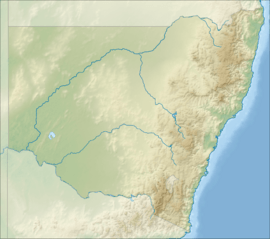Little Llangothlin Nature Reserve facts for kids
Quick facts for kids Little Llangothlin Nature ReserveNew South Wales |
|
|---|---|
|
IUCN Category IV (Habitat/Species Management Area)
|
|
| Nearest town or city | Llangothlin |
| Established | December 1979 |
| Area | 2.57 km2 (1.0 sq mi) |
| Managing authorities | NSW National Parks and Wildlife Service |
| Website | Little Llangothlin Nature Reserve |
| Footnotes | |
| Designated: | 17 March 1996 |
| Reference #: | 798 |
| See also | Protected areas of New South Wales |
| Little Llangothlin Lagoon | |
|---|---|
| Lua error in Module:Location_map at line 420: attempt to index field 'wikibase' (a nil value). | |
| Type | Freshwater, high altitude lake |
| Catchment area | Clarence River |
| Basin countries | Australia |
| Max. length | 1.38 km (0.86 mi) |
| Max. width | 1.17 km (0.73 mi) |
| Surface area | 1.20 km2 (0.46 sq mi) |
| Max. depth | 2 m (6 ft 7 in) |
| Surface elevation | 1,360 m (4,460 ft) |
The Little Llangothlin Nature Reserve is a special protected area in New South Wales, eastern Australia. It is a wetland nature reserve located on the Northern Tablelands in the New England region. The reserve covers about 257 hectares (635 acres).
It is located about 10 kilometres (6 miles) north-east of Llangothlin. It is also about 20 kilometres (12 miles) north-east of Guyra. The reserve was created in 1979 to protect its unique natural environment.
The reserve includes the 120-hectare (300-acre) Little Llangothlin Lagoon. It also has a part of the smaller Billy Bung Lagoon. In 1996, this reserve was recognized as a wetland of international importance. This happened under the Ramsar Convention, an international agreement to protect important wetlands.
A Special Place for Nature
The Little Llangothlin Nature Reserve is home to some of the last high-altitude freshwater lagoons. These lagoons are found on basalt soil, which is a type of soil formed from volcanic rock. This area is part of the New England Tableland.
Much of the land around the reserve has been cleared for farming. Because of this, the reserve acts as a safe haven for many different animals. It provides a home for birds, mammals, amphibians, and reptiles.
The reserve sits on the New England Plateau, about 1,360 metres (4,460 feet) above sea level. It is surrounded by farms. It protects a natural high-altitude lake, which is rare in this region. Most other similar lakes have been changed or cleared.
The lagoon fills a natural dip in the land. An old farm ditch that used to drain water away has been filled in. This helps the lagoon keep its original water depth of about 2 metres (6.6 feet) when it is full.
The plants in the reserve include sedges, herbs, and grassy woodlands. You can find trees like New England peppermints, snowgums, and silver wattles. Two rare plants, the Hairy Anchor Plant and Austral Toadflax, also grow here.
The wetlands in the reserve are a very important place for many waterbirds during dry times. They also support several kinds of frogs and reptiles. If you visit, you can walk around the lagoon on a 4.8-kilometre (3-mile) walking track.
 | Sharif Bey |
 | Hale Woodruff |
 | Richmond Barthé |
 | Purvis Young |


